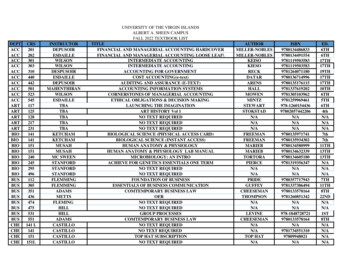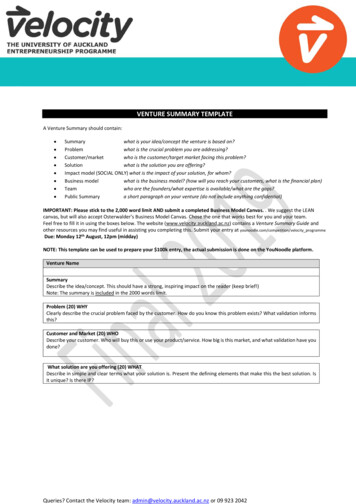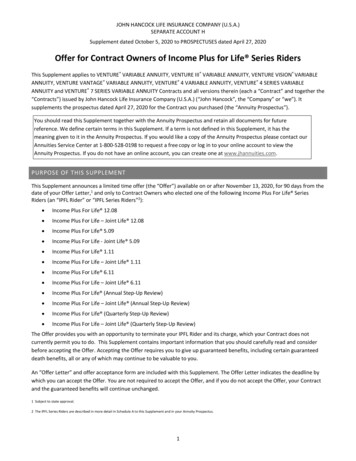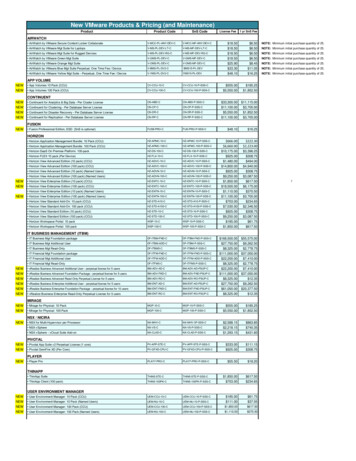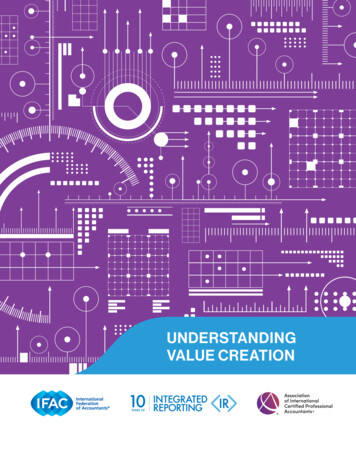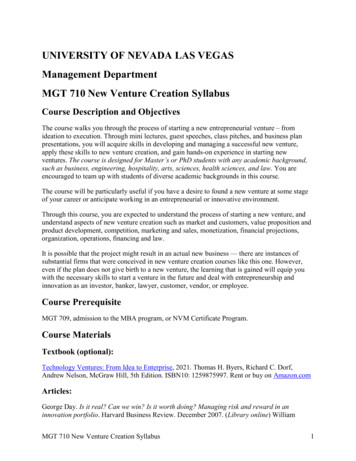
Transcription
UNIVERSITY OF NEVADA LAS VEGASManagement DepartmentMGT 710 New Venture Creation SyllabusCourse Description and ObjectivesThe course walks you through the process of starting a new entrepreneurial venture – fromideation to execution. Through mini lectures, guest speeches, class pitches, and business planpresentations, you will acquire skills in developing and managing a successful new venture,apply these skills to new venture creation, and gain hands-on experience in starting newventures. The course is designed for Master’s or PhD students with any academic background,such as business, engineering, hospitality, arts, sciences, health sciences, and law. You areencouraged to team up with students of diverse academic backgrounds in this course.The course will be particularly useful if you have a desire to found a new venture at some stageof your career or anticipate working in an entrepreneurial or innovative environment.Through this course, you are expected to understand the process of starting a new venture, andunderstand aspects of new venture creation such as market and customers, value proposition andproduct development, competition, marketing and sales, monetization, financial projections,organization, operations, financing and law.It is possible that the project might result in an actual new business — there are instances ofsubstantial firms that were conceived in new venture creation courses like this one. However,even if the plan does not give birth to a new venture, the learning that is gained will equip youwith the necessary skills to start a venture in the future and deal with entrepreneurship andinnovation as an investor, banker, lawyer, customer, vendor, or employee.Course PrerequisiteMGT 709, admission to the MBA program, or NVM Certificate Program.Course MaterialsTextbook (optional):Technology Ventures: From Idea to Enterprise, 2021. Thomas H. Byers, Richard C. Dorf,Andrew Nelson, McGraw Hill, 5th Edition. ISBN10: 1259875997. Rent or buy on Amazon.comArticles:George Day. Is it real? Can we win? Is it worth doing? Managing risk and reward in aninnovation portfolio. Harvard Business Review. December 2007. (Library online) WilliamMGT 710 New Venture Creation Syllabus1
Sahlman. How to write a great business plan? Harvard Business Review. July-August 1997.(Library online) and the short Q&A “Updating a Classic” http://hbswk.hbs.edu/item/5993.htmlHow to read a financial report (WebCampus)Additional references will be posted on WebCampus during the semester.Library Resources:Patrick Griffis Email: patrick.griffis@unlv.edu Phone: 895-2231Course Content and Learning OutcomesThe course has two main components. The first component focuses on understanding andsynthesizing concepts and techniques from the areas of strategy, finance, accounting, economics,marketing, operations, law and organizational theory in the context of new venture creation. Thesecond component—which constitutes the core of the class—is a project that focuses on theidentification, evaluation and implementation of an entrepreneurial opportunity. The project willprovide hands-on experience to apply the acquired concepts and techniques in a real worldsetting. The project is treated as a real start-up, so the course requires that you process a greatdeal of material and be prepared for intensive writing and presentation.You will develop skills to: Identify and evaluate entrepreneurial opportunities,Formulate strategies and design plans to execute,Write and present business plans,Participate in business plan competitions and i-Corps programsCourse ExpectationsPreparation: I will assume that you have read everything assigned. It is especially valuable andappreciated when you come to class with questions about the readings and guest speeches. Poorpreparation is a disservice to your classmates and will negatively impact your participationgrade.Class Professionalism: You will be individually evaluated based on your level ofprofessionalism in class and in class-related activities outside of class. Professionalism includes,but is not limited to, arriving to class on time, paying attention during course lectures and guestpresentations, not leaving early without telling the instructor beforehand, notifying the professorin advance when you will be absent from class, etc.Late Assignments: Assignments are due at the start of the class (unless otherwise noted). Lateassignments will be allowed only in cases of unavoidable personal or family emergencies andyou must notify me as soon as possible. In all other cases, there will be no credit provided forlate assignments.MGT 710 New Venture Creation Syllabus2
Academic Misconduct – Academic integrity is a legitimate concern for every member of theUniversity community. We all share in upholding the fundamental values of honesty, trust,respect, fairness, responsibility, and professionalism. By choosing to join the UNLV community,students accept the expectations of the Student Academic Misconduct Policy, and areencouraged to always take the ethical path whenever faced with choices. Students enrolling atUNLV assume the obligation to conduct themselves in a manner compatible with UNLV’seducational mission. An example of academic misconduct is plagiarism. Plagiarism is using thewords or ideas of another person, from the Internet or any other source without proper citation ofthe source(s). See the Student Conduct Code, .Class Notes Policy: Notes based on a class or lecture may only be made for purposes ofindividual or group study, or for other non-commercial purposes that reasonably arise from yourmembership in the class or attendance at the university. This restriction also applies to anyinformation distributed, disseminated or in any way displayed for use in relationship to the class,whether obtained in class, via email or otherwise on the Internet, or via any other medium.Again, it is a violation of the class code to share course materials with others without permissionfrom the instructor.No student may record any lecture, class discussion or meeting with the instructor without theinstructor’s prior express written permission.Suggestions: If you have special inquiries or constructive suggestions concerning the progress ofthe class, please feel free to talk to me after class. You can also make an appointment by e-mail.Course StructureWebCampus. Part of this will be delivered online through WebCampus (powered by Canvas).You will use your ACE account to login to the course on WebCampus. If you have not set up anACE account yet, please contact the OIT Help Desk. In Canvas, you will access online lessons,course materials, and other resources designed to deliver course content. Please review theCanvas Student Guide for guidance.Classes are offered through synchronous video sessions. Please note the following: Find a space that is appropriate for joining a video session (quiet, well-lit)Open the video link on timeParticipate in the class discussion when appropriate, either via the chat function orthrough your videoMute your audio unless instructed to unmuteTurn on your camera while in classNetiquette, a set of rules for behaving appropriately online. The instructor and fellow studentswish to promote a safe online learning environment. All opinions and experiences must berespected in the context of academic discourse. You are expected to comment, question, orcritique an idea but you must not attack an individual.MGT 710 New Venture Creation Syllabus3
Here are the netiquette guidelines: Be aware of possible miscommunication when face-to face interaction is absent; composeyourresponses in a positive, supportive, and constructive mannerDo not dominate the discussionGive other students the opportunity to join the discussionDo not use offensive languagePresent ideas appropriatelyDo not capitalize all letters, doing so suggest shoutingAvoid using slang languageShare tips with fellow studentsKeep an open mind and be willing to express even your minority opinion. Minorityopinions must berespectedThink and edit before you push the send buttonDo not hesitate to ask for feedbackTechnology NeededYou need to have acceptable technology for the course to be delivered online: A computer/laptop/tablet. You may request a loaner laptop at laptop@unlv.edu.A webcam or comparable video recording device (i.e. your camera phone)A web browser that is up-to-dateCanvas requires the following browser components:Flash is required for media recording, streaming, viewing, and uploading.The Java plug-in is required for several features in Canvas.Adobe Acrobat Reader is required to view documents in your browser.GradingThe final grading schedule is based on your points out of 100, as described below. You may keeptrack of your grades during the semester via WebCampus. In situations involving incompletegrades, please refer to the university policies below. A: 93 – 100A-: 85 – 92B : 80 – 84B: 75 – 79B-: 70 – 74C : 65 – 69C: 60 – 64C-: 55 – 59D:50 – 54F: Below 50MGT 710 New Venture Creation Syllabus4
Class Participation and EngagementClass discussion: Most of the learning in our class will occur through discussion. Thus, we wanteveryone’s active participation. Discussion will be a key in providing feedback on the classproject. Meaningful participation requires having carefully read and thought about the day’smaterial, but that is not sufficient. You also need to speak and while key insights are appreciated,you can also contribute by asking questions, politely disagreeing with comments, or following upon another student’s comments with further insights or evidence. Creative and critical thinkingwill be rewarded.Attendance and punctuality: You cannot contribute to our learning if you are not in class. Atthe same time, it is understood that you may have other responsibilities and priorities. To balancethese considerations, you are allocated one excused allowance. You can use it as you wish (e.g.,job interviews, family needs, health days) with no questions asked. On these occasions, you arestill responsible for turning in your assignment before the class session that you will miss. Pleasenote that I will not make arrangements for homework after the fact. For each absence beyond, 3points will be deducted from your individual participation grade. You may not use an excusedabsence on the day of a required meeting or presentation such as the final Feasibility Analysispitch. In the event of illness, please bring a note from the doctor to the next class session. Pleasebe on time. If lateness becomes an issue, I reserve the right to treat a class for which you are lateas a missed class. Please do not leave and re-enter the class.WebEx: I ask that you turn on video during the WebEx sessions so that we can bettercommunicate with each other. If you have problems with your equipment, please contact the IToffice for help.Coaching/mentoring: You will talk with coaches during the semester. In the coaching sessions,you will pitch to the coach, learn his/her feedback, and make adjustments to your new ventureproject where appropriate.Peer feedback: In order to ensure that final grades reflect your individual contribution to theteam project, I reserve the right to conduct a peer evaluation. You will be asked to rate thecontribution of each of the team members by assigning a percentage score to each member.Therefore, individual grades may vary within teams.Your level of in-class participation will be evaluated based on both the quality (relevance andinsightfulness) and quantity (frequency) of your participation. The evaluation of in-classparticipation quality is based on the following: Relevance – Does the comment or question meaningfully bear on the subject at hand?Irrelevant orinappropriate comments can detract from the learning experience.Responsiveness – Does the comment or question connect to what someone else has said?Analysis – Is the reasoning employed consistent and logical? Have data from coursematerials, personalexperience, or general knowledge been employed to support theassertions/findings?MGT 710 New Venture Creation Syllabus5
Value – Does the contribution further the understanding of the issues at hand?Clarity – Is the comment concise and understandable?Class participation tends to fall into the following categories: Outstanding: You are highly engaged in and prepared for each class session, contributinginsightfulquestions and thoughts (as measured against the criteria above).Excellent: You are moderately engaged in class, on a periodic basis, and occasionallycontributeinsightful questions and thoughts (as measured against the criteria above).Average: You are somewhat engaged in class, contributing periodic questions andthoughts that mightrepeat content already in play.Below Average: You rarely contribute in class.Non-Contributing: You do not contribute in class.MGT 710 New Venture Creation Syllabus6
UNLV PoliciesPublic Health DirectivesFace coverings are mandatory for all faculty and students in the classroom. Students must followall active UNLV public health directives while enrolled in this class. UNLV public healthdirectives are found at Health Requirements for Returning to uirements. Students who do not comply with thesedirectives may be asked to leave the classroom. Refusal to follow the guidelines may result infurther disciplinary action according to the UNLV Student Conduct Code,https://www.unlv.edu/sites/default/files/page files/27/StudentConduct-Code.pdf, including beingadministratively withdrawn from the course.Academic MisconductAcademic integrity is a legitimate concern for every member of the University community. Weall share in upholding the fundamental values of honesty, trust, respect, fairness, responsibility,and professionalism. By choosing to join the UNLV community, students accept the expectationsof the Student Academic Misconduct Policy, and are encouraged to always take the ethical pathwhenever faced with choices. Students enrolling at UNLV assume the obligation to conductthemselves in a manner compatible with UNLV’s educational mission. An example of academicmisconduct is plagiarism. Plagiarism is using the words or ideas of another person, from theInternet or any other source without proper citation of the source(s). See the Student ConductCode, t.Auditing a CourseAuditing a course allows a student to continue attending the lectures and/or laboratories anddiscussion sessions associated with the course, but the student will not earn a grade for anycomponent of the course. Students who audit a course receive the same educational experienceas students taking the course for a grade, but will be excused from exams, assessments, andother evaluative measures that serve the primary purpose of assigning a grade.Classroom ConductStudents have a responsibility to conduct themselves in class and in the libraries in ways that donot interfere with the rights of other students to learn, or of instructors to teach. Use of devicessuch as cellular phones and pagers, or other potentially disruptive activities are only permittedwith the prior explicit consent of the instructor. Students are specifically prohibited to recordclasses without instructor authorization, including online/remote classes (either audio only, orvideo and audio). The instructor may rescind permission at any time during the class. If a studentdoes not comply with established requirements or obstructs the functioning of the class, theinstructor may initiate an administrative withdrawal of the student from the course.Since the COVID-19 pandemic forced some instruction to be delivered remotely starting inSpring 2020, numerous students have asked instructors to record their synchronous classes, soMGT 710 New Venture Creation Syllabus7
that they can access them at their convenience. Instructors who agree to record their classes(audio only, or video and audio) should inform students in advance. Recorded lectures may notbe broadly released to anyone, but made available exclusively to those students enrolled in theclass during the particular academic term. Recorded lectures must be stored securely, and aresubject to the Nevada System of Higher Education’s Records Retention Policy, meaning that therecordings can only be deleted 120 days after the end of class (i.e., after grades are posted). Oncethis requirement is met, the recordings should be deleted. Class recordings are protected fromdisclosure, as they are deemed part of an educational record under the Family Educational Rightsand Privacy Act (FERPA).CopyrightThe University requires all members of the University Community to familiarize themselveswith, and to follow copyright and fair use requirements. You are individually and solelyresponsible for violations of copyright and fair use laws. The University will neither protect nordefend you, nor assume any responsibility for student or employee violations of fair use laws.Violations of copyright laws could subject you to federal and state civil penalties and criminalliability, as well as disciplinary action under University policies. Additional copyright policyinformation is available at https://www.unlv.edu/provost/copyright.Disability Resource Center (DRC)The UNLV Disability Resource Center (Student Services Complex, SSC-A, Room 143,https://www.unlv.edu/drc, telephone 702-895-0866) provides resources for students withdisabilities. Students who believe that they may need academic accommodations due to apermanent disability, temporary or permanent medical need, or academic support due topregnancy are encouraged to contact the DRC as early as possible in the academic term. ADisabilities Specialist will discuss what options may be available to you. Students who arealready registered with the DRC should request their accommodations online each semester, andmake an appointment to discuss their accommodations with their instructors.Final ExaminationsThe University requires that final exams given at the end of a course occur on the date and at thetime specified in the Final Exam schedule. The Final Exam schedule is typically available at thestart of the semester, and the classroom locations are available approximately one month beforethe end of the semester. See the Final Exam Schedule, https://www.unlv.edu/registrar/calendars.Identity Verification in Online CoursesAll UNLV students must use their Campus-issued ACE ID and password to log in toWebCampus-Canvas.UNLV students enrolled in online or hybrid courses are expected to read and adhere to theStudent Academic Misconduct Policy, icy,which states that “acting or attempting to act as a substitute for another, or using or attempting toMGT 710 New Venture Creation Syllabus8
use a substitute, in any academic evaluation or assignment” is a form of academic misconduct.Intentionally sharing ACE login credentials with another person may be considered an attempt touse a substitute, and could result in investigation and sanctions, as outlined in the StudentAcademic Misconduct Policy.UNLV students enrolled in online courses are also expected to read and adhere to the AcceptableUse of Computing and Information Technology Resources -policy, which prohibits sharing university accounts with other persons withoutauthorization.To the greatest extent possible, all graded assignments and assessments in UNLV online coursesshould be hosted in WebCampus-Canvas or another UNLV-managed platform that requires ACElogin credentials for access.Incomplete GradesThe grade of “I” (Incomplete) may be granted when a student has satisfactorily completed threefourths of course work for that semester/session, but cannot complete the last part of the coursefor reason(s) beyond the student’s control and acceptable to the instructor, and the instructorbelieves that the student can finish the course without repeating it. For undergraduate courses,the incomplete work must be made up before the end of the following regular semester. Graduatestudents receiving “I” grades in 500-, 600-, or 700-level courses have up to one calendar year tocomplete the work, at the discretion of the instructor. If course requirements are not completedwithin the period indicated, a grade of “F” will be recorded, and the student’s GPA will beadjusted accordingly. Students who are fulfilling an Incomplete grade do not register for thecourse, but make individual arrangements with the instructor who assigned the “I” grade.Library ResourcesLibrarians are available to consult with students on research needs, including developingresearch topics, finding information, and evaluating sources. To make an appointment with asubject expert for this class, please visit the Libraries’ Research Consultation ts/librarian. You can also ask the library staff questionsvia chat and text message at https://ask.library.unlv.edu/.Missed ClassworkAny student missing class, quizzes, examinations, or any other class or laboratory work becauseof observance of religious holidays will be given an opportunity during that semester to make upthe missed work. The make-up opportunity will apply to the religious holiday absence only. It isthe responsibility of the student to notify the instructor within the first 14 calendar days of thecourse for Fall and Spring courses (except for modular courses), or within the first 7 calendardays of the course for Summer and modular courses, of their intention to participate in religiousholidays which do not fall on state holidays or periods of class recess. For additionalinformation, please visit the Missed Classwork policy, under Registration Policies, on theMGT 710 New Venture Creation Syllabus9
Academic Policies d 32&navoid 8271&hl .In accordance with the policy approved by the Faculty Senate regarding missed class time andassignments, students who represent UNLV in any official extracurricular activity will also havethe opportunity to make up assignments, provided that the student submits official writtennotification to the instructor no less than one week prior to the missed class(es).The spirit and intent of the policy for missed classwork is to offer fair and equitable assessmentopportunities to all students, including those representing the University in extracurricularactivities. Instructors should consider, for example, that in courses which offer a “Drop one”option for the lowest assignment, quiz, or exam, assigning the student a grade of zero for anexcused absence for extracurricular activity is both contrary to the intent of the Faculty Senate’spolicy, and an infringement on the student’s right to complete all work for the course.This policy will not apply in the event that completing the assignment or administering theexamination at an alternate time would impose an undue hardship on the instructor or theUniversity that could be reasonably avoided. There should be a good faith effort by both theinstructor and the student to agree to a reasonable resolution. When disagreements regarding thispolicy arise, decisions can be appealed to the Department Chair/School Director, College/SchoolDean, and/or the Faculty Senate Academic Standards Committee.For purposes of definition, extracurricular activities may include, but are not limited to academicrecruitment activities, competitive intercollegiate athletics, fine arts activities, liberal arts competitions,science and engineering competitions, and any other event or activity sanctioned by a College/SchoolDean, and/or by the Executive Vice President and Provost.RebelmailRebelmail is UNLV’s official email system for students and by University policy, instructors andstaff should only send emails to students’ Rebelmail accounts. Rebelmail is one of the primaryways in which students receive official University communications, information about deadlines,major Campus events, and announcements. All UNLV students receive a Rebelmail accountafter they have been admitted to the University. Sending emails within WebCampus-Canvas isalso acceptable.Tutoring and CoachingThe Academic Success Center (ASC), at the Claude I. Howard Building, provides tutoring,academic success coaching, and other academic assistance for all UNLV undergraduate students.For information regarding tutoring subjects, tutoring times, and other ASC programs andservices, please visit the ASC website, https://www.unlv.edu/asc, or call 702-895-3177. The ASCis located across from the Student Services Complex (SSC). Academic success coaching islocated on the second floor of SSC A, Room 254. Drop-in tutoring is located on the second floorof the Lied Library, and on the second floor of the College of Engineering building (TBE A207).MGT 710 New Venture Creation Syllabus10
UNLV Writing CenterOne-on-one or small group assistance with writing is available free of charge to UNLV studentsat the Writing Center, https://writingcenter.unlv.edu/, located in the Central Desert Complex,Building 3, Room 301 (CDC 3–301). Walk-in consultations are sometimes available, butstudents with appointments receive priority assistance. Students may make appointments inperson or by calling the Center, telephone 702-895-3908. Students are requested to bring to theirappointments their Rebel ID Card, a copy of the instructions for their assignment, and two copiesof any writing they have completed on their assignment.Diversity StatementAs an institution of higher learning, UNLV represents a rich diversity of human beings among itsfaculty, staff, and students, and is committed to aspiring to maintain a Campus environment thatvalues that diversity. Accordingly, the University supports understanding and appreciation of allmembers of its community, regardless of race, sex, age, color, national origin, ethnicity, creed,religion, disability, sexual orientation, gender, gender identity, marital status, pregnancy, geneticinformation, veteran status, or political affiliation. Please see University Statements andCompliance, https://www.unlv.edu/about/statements-compliance.A successful learning experience requires mutual respect and trust between the students and theinstructor. Accordingly, the instructor asks that students be willing to listen to one another’spoints of view, acknowledging that there may be disagreements, keep discussion and commentson topic, and use first person, positive language when expressing their perspectives.MGT 710 New Venture Creation Syllabus11
UNIVERSITY OF NEVADA LAS VEGAS Management Department MGT 710 New Venture Creation Syllabus Course Description and Objectives The course walks you through the process of starting a new entrepreneurial venture - from ideation to execution. Through mini lectures, guest speeches, class pitches, and business plan presentations, you will acquire skills in developing and managing a successful new .
